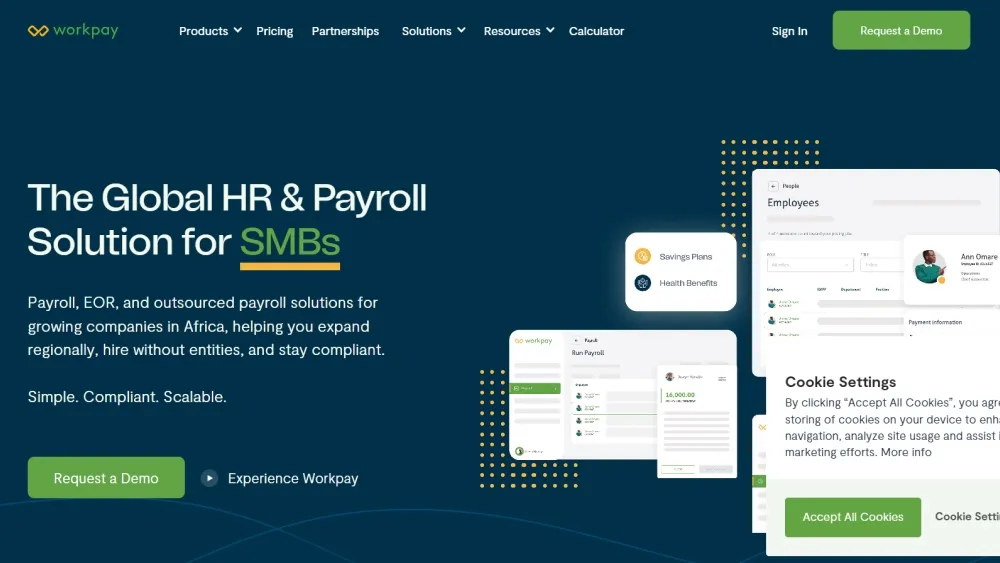Workpay Overview & 2026 Industry Position
In an increasingly borderless business world, Workpay emerges as a pivotal player for companies managing remote teams across Africa. Originally designed to simplify payroll and compliance for Kenyan-based firms, Workpay has evolved into a pan-African HR, payroll, and compliance platform. In 2026, with regulations tightening and distributed teams becoming the norm, HR leaders prioritize tools offering scalability, country-specific compliance, and unified team management. Workpay delivers, making it an indispensable choice for mid-sized companies and startups aiming to expand seamlessly across the continent.
From Launch to 2026: Workpay’s Journey
Founded in 2019 by Paul Kimani and Fabric Kwizera, Workpay started as a payroll software for businesses in Kenya. By 2020, it introduced time-tracking functionality, allowing companies to monitor productivity alongside payments. A pivotal moment came in 2021 when Workpay expanded its presence into Nigeria and later Uganda as demand for compliance management grew. In 2022, the company raised $2.7M in seed funding to fuel its platform upgrades and regional expansion. By late 2023, Workpay had processed over $200M in salaries across Africa.
In 2026, its strategy centers on becoming the go-to African Employer of Record (EOR)—simplifying HR, payroll, benefits, and compliance for companies hiring across 35+ African countries.

Workpay Key Features
Workpay offers a modular suite of HR and payroll capabilities tailored to the diverse workforces across Africa. Its key features include:
- Payroll Automation: Country-specific compliance, automated tax filing, and salary disbursements in local currencies.
- Time & Attendance: Geofenced clock-in via mobile app and web dashboard.
- HR Management: Employee records, leave management, onboarding/offboarding workflows.
- Employer of Record (EOR): Hire full-time employees anywhere in Africa without a legal entity.
- Remote Tools: Digital payslips, secure document storage, and self-service employee portals.
Workflow & UX
Workpay offers a modern and intuitive user experience. The platform balances functionality with accessibility through clearly labeled menus, a left-hand admin panel, and minimal training requirements for team adoption. The mobile app allows employees to check attendance, submit leave requests, and download payslips. Meanwhile, HR managers and finance teams appreciate the automated alerts, end-of-month reports, and compliance nudges tailored by geography.
Workpay Pricing Analysis & Value Metrics
As of July 2026, Workpay offers tiered options based on company needs and size. Local and EOR pricing plans ensure flexibility:
| Plan | Monthly Cost | Includes |
|---|---|---|
| HR & Payroll (Local) | $4/user | Payroll, tax remittance, time tracking, e-payslips |
| EOR (Remote) | Varies (avg. $300–400 per employee) | Full compliance, local contracts, benefits, onboarding, liability cover |
| Custom Enterprise | Quote-based | Multi-country HR stack, integrations, API access, SLA support |
The pricing reflects excellent value, particularly for international teams hiring locally without legal presence. EOR costs align with industry averages while giving Workpay a regional compliance edge.
Competitive Landscape
African and global EOR platforms are racing to claim the mid-market HR niche. Here’s how Workpay compares:
| Provider | Specialties | Price Range | Best For |
|---|---|---|---|
| Workpay | Africa-focused HR + Payroll; strong compliance | $4–$400 | Pan-African SMBs & startups |
| Deel | Global EOR, integrations, freelancer support | $49–$599+ | Multinational HQs or remote-first firms |
| Remote.com | International hiring, benefits, IC tools | $99+/employee | Funded tech companies |
| SeamlessHR | Nigeria-based HRIS, payroll | Quote-based | West African teams |
Common Use Cases
- Startups hiring technical talent from Kenya, Nigeria, and Ghana without setting up local entities.
- NGOs or research firms that need country-specific compliance and salary management for field teams.
- Local businesses migrating from spreadsheets to automated tax-calculating payroll engines.
- Remote-first ventures expanding into Africa while ensuring documented compliance and contracts.
Integrations That Enhance Operations
Workpay integrates with tools that enhance payroll, tax reporting, and employee communication:
- Slack & Microsoft Teams: For attendance tracking and leave updates.
- QuickBooks & Xero: Finance and wage reconciliation.
- African mobile money solutions: M-Pesa, Flutterwave, Paystack.
- Calendar & Email platforms: Sync for leave/holidays and HR reminders.
Pros & Cons
- Pros:
- Tailored for African business environments, laws, and currencies.
- Excellent UX with mobile-friendly employee self-service tools.
- In-country experts ensure timely compliance and filings.
- Affordable pricing for local and EOR use cases.
- Cons:
- EOR pricing can scale up quickly for large remote teams.
- Fewer integrations compared to larger global competitors.
- Some features still improving (e.g., analytics dashboard depth).
Pro Tip: If you’re scaling your remote team across East and West Africa, start with Workpay’s free trial to map local hiring costs and compliance needs.
Final Thoughts
For companies focused on building sustainable, compliant African teams, Workpay strikes an unmatched balance of regional knowledge, product versatility, and affordability. While it may not suit global corporations needing full API extensibility or 100+ integration options, it delivers top-tier value for startups and mid-sized firms looking to legally grow across local markets without expanding overhead or legal exposure.
Workpay FAQ
As of 2026, Workpay supports payroll and EOR services in over 35 African countries including Kenya, Nigeria, South Africa, Ghana, Uganda, and Rwanda.
Yes, as part of its EOR offering, Workpay helps structure and administer employee benefits such as health insurance, pension, and statutory contributions where applicable.
Yes, Workpay offers direct integrations with QuickBooks and other accounting platforms to synchronize payroll data and streamline financial reporting.
Yes, Workpay supports contractor payments with appropriate documentation and tax compliance per country except under its EOR tier which applies to full-time employees.
No, Workpay acts as the legal employer on your behalf, allowing you to hire in countries where you do not have a registered entity.

